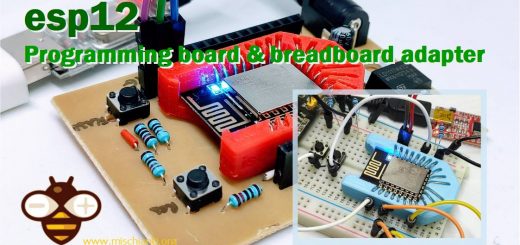Home › Forums › The libraries hosted on the site › PCF8574 i2c digital I/O expander › More than one pcf8574 expander
Tagged: pcf8574
- This topic has 11 replies, 1 voice, and was last updated 4 years, 2 months ago by
Renzo Mischianti.
-
AuthorPosts
-
-
11 August 2020 at 16:46 #5522
hmronline
Could you please provide an example for initializing a few (let’s say 4) gpio expanders ?
I was thinking on having an array, in order to be able to do something like this: gpioExpander[3].digitalWrite(7, HIGH);Is that possible ?
Thanks in advance!
-
11 August 2020 at 16:48 #5523
Hi hmronline,
I think something like this can work#include "Arduino.h" #include "PCF8574.h" PCF8574 pcf8574_1(0x38); PCF8574 pcf8574_2(0x39); PCF8574 arrayOfPCF[2]; //The setup function is called once at startup of the sketch void setup() { Serial.begin(115200); pcf8574_1.pinMode(P0, OUTPUT); pcf8574_1.pinMode(P1, OUTPUT); pcf8574_1.pinMode(P2, OUTPUT); pcf8574_2.pinMode(P1, OUTPUT); pcf8574_2.pinMode(P2, OUTPUT); pcf8574_2.pinMode(P3, OUTPUT); pcf8574_1.begin(); pcf8574_2.begin(); arrayOfPCF[0] = pcf8574_1; arrayOfPCF[1] = pcf8574_1; } void loop() { arrayOfPCF[0].digitalWrite(P1, HIGH); arrayOfPCF[1].digitalWrite(P1, HIGH); delay(2000); arrayOfPCF[0].digitalWrite(P1, HIGH); arrayOfPCF[1].digitalWrite(P1, HIGH); delay(2000); }Give me a feedback.
Bye Renzo -
11 August 2020 at 16:49 #5524
hmronline
Hi Renzo, thanks for you prompt response!
I’ve tried something similar before, but no luck with that, I’ve got an error on array declaration: no matching function for call to ‘PCF8574::PCF8574()’
Any suggestions ?
-
11 August 2020 at 16:49 #5525
I try to compile my sketch and no error, can you post your code??
-
11 August 2020 at 16:51 #5526
hmronline
I’m using your code, but have to mention I’m testing it with platform.io (using visual studio code).
The provided error appears after hitting Build task.Complete error message is:
src/main.cpp:7:21: error: no matching function for call to 'PCF8574::PCF8574()'
PCF8574 arrayOfPCF[2];
^
src/main.cpp:7:21: note: candidates are:
In file included from src/main.cpp:2:0:
.pio/libdeps/nodemcuv2/PCF8574 library/PCF8574.h:111:2: note: PCF8574::PCF8574(uint8_t, uint8_t, uint8_t, uint8_t, void (*)())
PCF8574(uint8_t address, uint8_t sda, uint8_t scl, uint8_t interruptPin, void (*interruptFunction)());
^
.pio/libdeps/nodemcuv2/PCF8574 library/PCF8574.h:111:2: note: candidate expects 5 arguments, 0 provided
.pio/libdeps/nodemcuv2/PCF8574 library/PCF8574.h:110:2: note: PCF8574::PCF8574(uint8_t, uint8_t, uint8_t)
PCF8574(uint8_t address, uint8_t sda, uint8_t scl);
^
.pio/libdeps/nodemcuv2/PCF8574 library/PCF8574.h:110:2: note: candidate expects 3 arguments, 0 provided
.pio/libdeps/nodemcuv2/PCF8574 library/PCF8574.h:107:2: note: PCF8574::PCF8574(uint8_t, uint8_t, void (*)())
PCF8574(uint8_t address, uint8_t interruptPin, void (*interruptFunction)() );
^
.pio/libdeps/nodemcuv2/PCF8574 library/PCF8574.h:107:2: note: candidate expects 3 arguments, 0 provided
.pio/libdeps/nodemcuv2/PCF8574 library/PCF8574.h:106:2: note: PCF8574::PCF8574(uint8_t)
PCF8574(uint8_t address);
^
.pio/libdeps/nodemcuv2/PCF8574 library/PCF8574.h:106:2: note: candidate expects 1 argument, 0 provided
.pio/libdeps/nodemcuv2/PCF8574 library/PCF8574.h:103:7: note: constexpr PCF8574::PCF8574(const PCF8574&)
class PCF8574 {
^
.pio/libdeps/nodemcuv2/PCF8574 library/PCF8574.h:103:7: note: candidate expects 1 argument, 0 provided
.pio/libdeps/nodemcuv2/PCF8574 library/PCF8574.h:103:7: note: constexpr PCF8574::PCF8574(PCF8574&&)
.pio/libdeps/nodemcuv2/PCF8574 library/PCF8574.h:103:7: note: candidate expects 1 argument, 0 provided
*** [.pio/build/nodemcuv2/src/main.cpp.o] Error 1
-
11 August 2020 at 16:52 #5527
hmronline
Could you add an option to set I2C Address with begin function instead of setting it with class constructor ?
As an example, this library (which seems its abandoned) receives I2C address on begin function: https://github.com/microseti/pcf857x
It seems this way is easier to set an array of PCF8574 instances, something like this:
#include "Arduino.h" #include "PCF8574.h" PCF8574 arrayOfPCF[2]; //The setup function is called once at startup of the sketch void setup() { Serial.begin(115200); // This way, I2C addresses could be determined during execution time (maybe obtained with an i2cscanner function). arrayOfPCF[0].begin(0x38); arrayOfPCF[1].begin(0x39); arrayOfPCF[0].pinMode(P0, OUTPUT); arrayOfPCF[0].pinMode(P1, OUTPUT); arrayOfPCF[0].pinMode(P2, OUTPUT); arrayOfPCF[1].pinMode(P1, OUTPUT); arrayOfPCF[1].pinMode(P2, OUTPUT); arrayOfPCF[1].pinMode(P3, OUTPUT); } void loop() { arrayOfPCF[0].digitalWrite(P1, HIGH); arrayOfPCF[1].digitalWrite(P1, HIGH); delay(2000); arrayOfPCF[0].digitalWrite(P1, HIGH); arrayOfPCF[1].digitalWrite(P1, HIGH); delay(2000); }What do you think ?
-
11 August 2020 at 16:54 #5528
Hi hmronline,
It’s true, the sketch not working on Arduino, only in esp8266 core, try this#include "Arduino.h" #include "PCF8574.h" PCF8574 pcf8574_1(0x38); PCF8574 pcf8574_2(0x39); PCF8574* arrayOfPCF[2]; //The setup function is called once at startup of the sketch void setup() { Serial.begin(115200); pcf8574_1.pinMode(P0, OUTPUT); pcf8574_1.pinMode(P1, OUTPUT); pcf8574_1.pinMode(P2, OUTPUT); pcf8574_2.pinMode(P1, OUTPUT); pcf8574_2.pinMode(P2, OUTPUT); pcf8574_2.pinMode(P3, OUTPUT); pcf8574_1.begin(); pcf8574_2.begin(); arrayOfPCF[0] = &pcf8574_1; arrayOfPCF[1] = &pcf8574_2; } void loop() { arrayOfPCF[0]->digitalWrite(P1, HIGH); arrayOfPCF[1]->digitalWrite(P1, HIGH); delay(2000); arrayOfPCF[0]->digitalWrite(P1, HIGH); arrayOfPCF[1]->digitalWrite(P1, HIGH); delay(2000); }or
#include "Arduino.h" #include "PCF8574.h" PCF8574 pcf8574_1(0x38); PCF8574 pcf8574_2(0x39); PCF8574 arrayOfPCF[2] = {pcf8574_1, pcf8574_2}; //The setup function is called once at startup of the sketch void setup() { Serial.begin(115200); pcf8574_1.pinMode(P0, OUTPUT); pcf8574_1.pinMode(P1, OUTPUT); pcf8574_1.pinMode(P2, OUTPUT); pcf8574_2.pinMode(P1, OUTPUT); pcf8574_2.pinMode(P2, OUTPUT); pcf8574_2.pinMode(P3, OUTPUT); pcf8574_1.begin(); pcf8574_2.begin(); } void loop() { arrayOfPCF[0].digitalWrite(P1, HIGH); arrayOfPCF[1].digitalWrite(P1, HIGH); delay(2000); arrayOfPCF[0].digitalWrite(P1, HIGH); arrayOfPCF[1].digitalWrite(P1, HIGH); delay(2000); }Bye Renzo
-
11 August 2020 at 16:54 #5529
hmronline
Second option seems its working fine for me, thank you Renzo!
-
9 March 2021 at 08:27 #10489
sergio contro
Ciao.
First example , last row before loop function :
arrayOfPCF[1] = &pcf8574_1;should be
arrayOfPCF[1] = &pcf8574_2;-
9 March 2021 at 08:37 #10490
Hi Sergio,
Thanks, I fixed It.
Bye Renzo
-
-
20 September 2021 at 11:12 #14937
Chandrasiri
I need to have two PCF8574s and one of them will use INT . I use them with ESP8266 and wish to define pins for SDA and SCL. So I need to define Address, SDA Pin No, SCL Pin No, Interrupt Pin No, Interrupt Function but pcf8574 constructor can only accept 3 (either ADD, SDA, SCL or ADD, Int Pin, Int Function). Pls help how to do this
-
20 September 2021 at 14:17 #14948
Hi,
you can check this to understand the basic constructor.To manage interrupt you can find all information here at this link.
Bye Renzo
-
-
AuthorPosts
- You must be logged in to reply to this topic.





